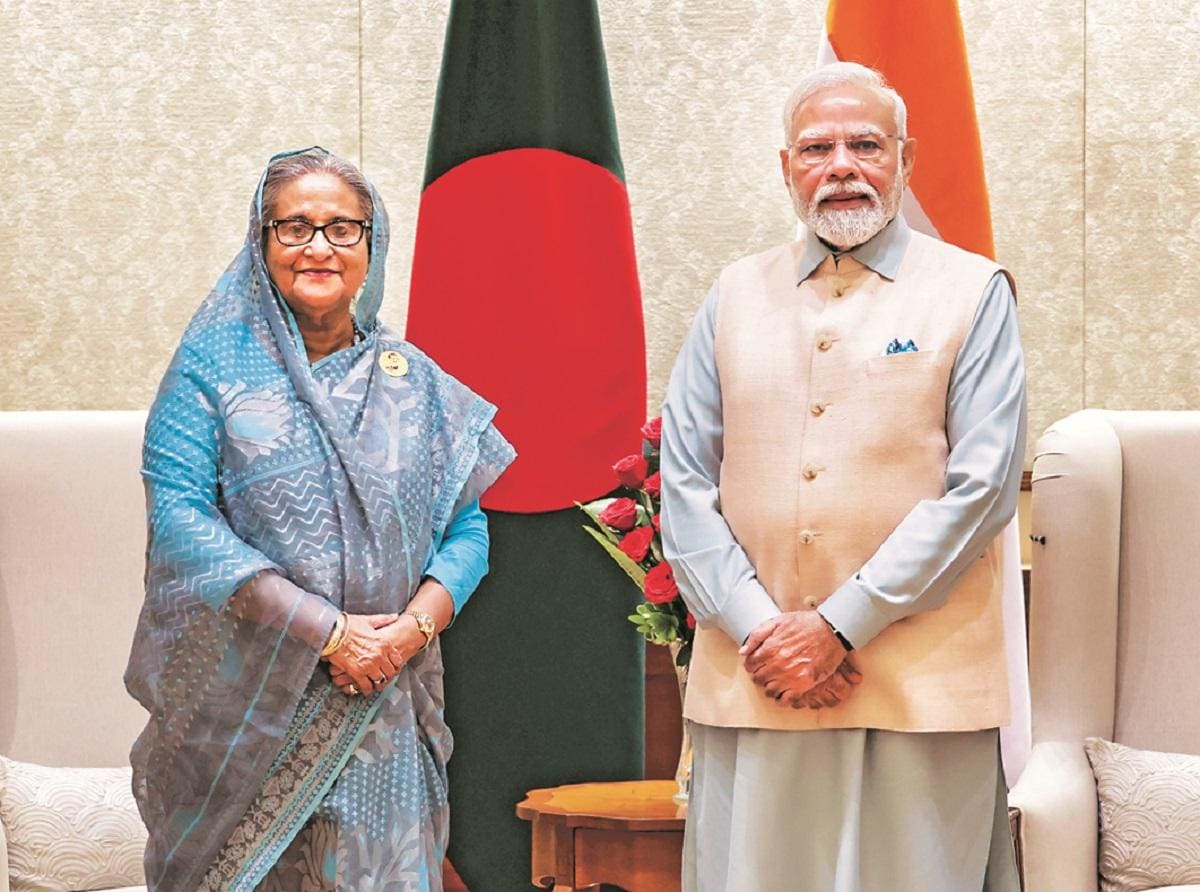There are domestic political compulsions currently in both countries to resolve contentious pending issues relating to the release of river waters to Bangladesh
 KRC TIMES Desk
KRC TIMES Desk

India and Bangladesh will seek to cover new areas of bilateral cooperation and regional development with Bangladeshi Prime Minister Sheikh Hasina visits Delhi later this month, or in July, to hold scheduled talks with Indian Prime Minister Narendra Modi.
Going by recent reports/analyses in the Bangladeshi media, sharing the region’s water resources more effectively could receive top priority in the expanded bilateral dialogue.
The stage has been set for the coming negotiations on this and a variety of other issues through preliminary talks held during Hasina’s short visit to Delhi for Modi’s swearing-in for the third time as India’s Prime Minister.
The Bangladesh Prime Minister was the first among international leaders, and a stronger commitment is expected from both countries to work out comprehensive agreements on sharing Teesta and Ganga river waters. New water sharing arrangements have become almost inevitable, not least because of increasing environmental degradation and climate change-related destruction.
There are domestic political compulsions currently in both countries to resolve contentious pending issues relating to the release of river waters to Bangladesh.
Until two/three years ago, the deadlock caused by West Bengal’s refusal to share Teesta river waters with Bangladesh in the dry winter season had been allowed to fester. The situation was desperate from Dhaka’s point of view as agriculture, fishing and the rural economy in Bangladesh’s northern districts took a massive hit.
Especially, the position of the ruling Awami league (AL) and its leader, Sheikh Hasina, came under a cloud at home, as Islamic extremist opposition forces, led by Bangladesh Nationalist Party (BNP), denounced them as “India’s agents”.
What was commonly perceived as Dhaka’s miserable failure to secure even minimum justice/action from successive Indian political leaders, from the BJP and the Congress, soured not just Indo-Bangla relations, but also embittered public perceptions about India.
As for India, both BJP and Congress leaders had problems dealing with Bengal Chief Minister Mamata Banerjee. But for once, she was factually on firm ground: there was no doubt that the Teesta in winter months was reduced to a narrow, barely flowing stream.
According to one Bangladeshi estimate, during the dry season, the length of the river was reduced from about 116 kilometres to only 100, as the flow neared Bangladesh. Even if Bangladesh was fully entitled to its share of the downstream waters as the Teesta was an international river, what could be done if there was little water to share?
Bangladeshi experts pointed out during discussions on the electronic media that in recent years, at least 26 hydropower projects with varying power producing capacities had been implemented in Sikkim, which involved the extensive use of the Teesta waters.
On average, each project consumed at least 5 percent of the water, which meant very little supply was left for downstream flow. No wonder the situation turned critical during the dry winter months. For India, the problem was, let alone meeting Bangladeshi demands, even West Bengal hardly got much water from the river in the dry months.

Experts contended that the only solution was to build a reservoir somewhere along the upper reaches of the Teesta so that excess water available from the monsoon rains, which led to massive flooding annually, could be stored and used later. Such a project was estimated to cost around $1 billion.
Receiving little help from Delhi, other than verbal assurances, Dhaka eventually turned to China. Not to lose such an opportunity, China agreed to help instantly, promising an investment of $300 million into a variety of projects including reservoir construction, laying out irrigation canals, improving pisciculture, deepening the river, launching rafting and tourism-related activities.
This spurred the Narendra Modi-led BJP into taking a fresh look at the problem. The moment China showed intent to involve itself deeply into making serious investments into the politically-sensitive, strategically important North Bengal region, Delhi-based policy-makers could not remain Idle.
As things stand, especially after the massive new Chinese-built Padma bridge has been built as an economic game-changer, China’s prestige and support among common Bangladeshis went up considerably.
Suddenly, India understood that solving the problem of Teesta water sharing was no longer just a headache for Bangladesh — neglecting it and letting China sort out the matter on its own terms with Bangladesh, could prove strategically disastrous for Delhi. So, the settling of the Teesta water issue also became a domestic compulsion for India.
Interestingly, a Bangladeshi expert participating in a TV talk show, pointed out that India quietly sent a high-ranking official a few days ago, during the Lok sabha elections to Dhaka, who met senior administrators in Bangladesh, indicating India’s desire to discuss the possibility of building a reservoir in the Himalayan region to hold the excess water that could be collected during the monsoon in the Teesta.
According to reports, he also offered India’s assistance/participation to join any scheme that Bangladesh was willing to take up to secure more water from the Teesta. The expert said that such a visit by an Indian official during the Lok Sabha poll campaign was “highly unusual”. However, he did not reveal whether the Indian official had indicated that if necessary India could even join the project with China.

What seems certain is that originally it was not a part of Delhi’s immediate plans to address the Teesta water sharing issue, never mind the short or long term impact of its indifference to Bangladesh. The prospect of the Chinese moving into the north Bengal region in a major way and securing a permanent footing/presence in a sensitive region forced a rapid rethink on the part of the Delhi-based defence top brass.
As for working out a new Ganga water sharing treaty/arrangement, Bangladeshis acknowledge that both sides might find it possible to work out a mutually acceptable formula. India was not satisfied with the existing treaty which left very little water for India, adding to the siltation problems for the Calcutta port. Bangladesh, on the other hand, claimed that over the years, many of its previously irrigated areas had gone dry as an ecological outcome of the Farakka project. The debate rages on.


